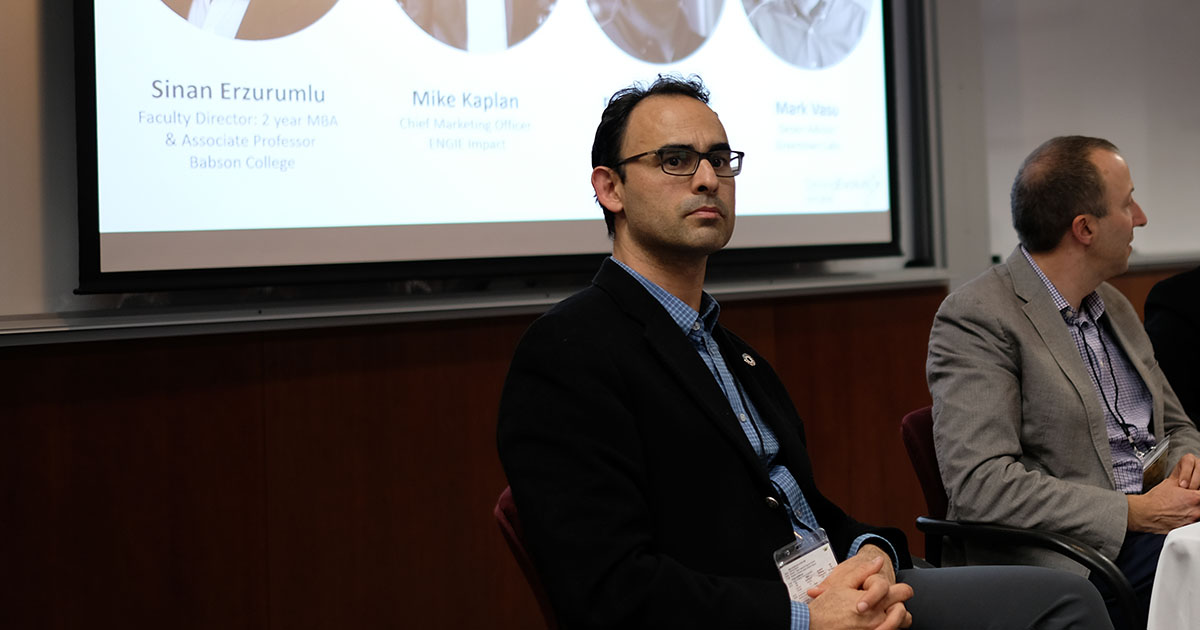The Growing Need for Sustainability in Business

There’s no way to sugar coat the blunt truth of the matter: Climate change is a monumental challenge. “The environment is in crisis,” says Sinan Erzurumlu, associate professor of operations management at Babson College. “The problem is real. It’s happening.”
The vastness of the problem can feel daunting, but when pondering how humanity might take action and confront climate change, Erzurumlu often finds inspiration from business. “I see some organizations come forward with stellar ideas,” he says. “Those kinds of things encourage me the most. They energize me.”
At Babson’s Olin Hall, Erzurumlu recently moderated a panel on sustainability in business that looked at how leaders and entrepreneurs can more broadly think about the impacts their organizations are having on communities and environments. Titled “Sustainability and Systems Thinking,” the panel was part of the Babson Entrepreneurship Forum, a student-organized event bringing together thought leaders, business owners, and entrepreneurs from a range of industries.
The sustainability panel pushed businesses to think beyond the walls of their offices to the people and places around them. “We are going to talk about those individuals who are really working on this and trying to make change,” Erzurumlu told the students gathered in attendance. “Hopefully, they will give you insights that will spark you, so that you will take up your own ideas.”
The 50,000-Foot View
So what exactly does this “systems thinking,” this broadening of business mindset, look like? It’s about perspective. “Are you in the 5,000-foot view, or are you at the 50,000-foot view?” says Erzurumlu “Are you seeing business in the short term, or are you looking at the consequences in the long term?”
As an example, Erzurumlu says to imagine that you are a seller of fish. For years, you may have simply paid fishermen for their catches, without regard to what was happening to the seas. “Fisheries are in peril,” says Erzurumlu. “To solve the fisheries problem, you need to start working with the fishermen. If you only pay for their fish, they will only care for catching more fish. You need to look beyond the transaction.”
If the fishing continues unabated, the fishermen will eventually have nothing more to catch, leaving you with nothing more to sell. Instead, says Erzurumlu, what if you paid the fishermen, not just for their catches, but also to follow environmental regulations that will protect the fisheries?
Small Changes Add Up
Erzurumlu admits that not all businesses are ready for such a commitment. “This gives them a level of responsibility they may not want to sign up for,” he says. But, frankly, doing sustainability in business requires commitment. It requires planning and effort and time.
“It’s a journey. You just can’t do it overnight,” says Mike Kaplan, the chief marketing officer of ENGIE Impact, a sustainability and energy management company.
Kaplan was one of the speakers at the sustainability panel. He was joined by Mark Vasu, the senior advisor at Greentown Labs, a cleantech startup incubator based in Somerville, Massachusetts.
Vasu says the time is right for businesses to become involved in sustainability. Their efforts are needed. “Our federal government is completely lacking in leadership,” he says. “There is so much that needs to be done. The problem is so big. There is nothing but opportunity.”
The world needs entrepreneurs working in this area. The opportunities are limitless. The idea is to go out and do it.
Sinan Erzurumlu, associate professor of operations management
One entrepreneur taking advantage of that opportunity is Ravish Majithia MBA’18, another panel speaker. Majithia is the co-founder and CEO of Magnomer, a startup that makes magnetic inks that allow packaging labels, which are not recyclable, to be more easily removed during the recycling process.
Majithia says his company is trying to solve a very small and specific problem, but in time, he’s hoping it can move the entire packaging industry to a more sustainable place. “Small changes, like what we do, can impact the larger scheme,” says Majithia.
The Future of Sustainability in Business
When he looks to the future of sustainability in business, Erzurumlu thinks of young entrepreneurs like Majithia, and he thinks of Babson students. “When I meet and work with young minds who are willing to challenge the existing system and spend their time solving complex social and environmental problems, I feel they are a significant force,” he says.
As the sustainability panel came to a close, Erzurumlu turned to the students in the audience. “I hope you choose to spend your life working on sustainable goals,” he said to them. “The world needs entrepreneurs working in this area. The opportunities are limitless. The idea is to go out and do it.”
Posted in Entrepreneurial Leadership, Insights




